A LSO B Y D AVID H ERBERT D ONALD
Lincoln at Home: Two Glimpses of Abraham Lincoln's Family Life
The Civil War and Reconstruction (with Jean H. Baker and Michael R Holt)
Lincoln Reconsidered: Essays on the Civil War Era Lincoln
Look Homeward: A Life of Thomas Wolfe
Liberty and Union: The Crisis of Popular Government, 1830-1890
The Great Republic: A History of the American People (with Bernard Bailyn, David Brion Davis, Robert Dallek, John L.Thomas, and Gordon S.Wood)
Gone for Soldier: The Civil War Memoirs of Private Alfred Bellard (editor)
Charles Sumner and the Rights of Man
The Politics of Reconstruction, 18631867
Diary of Charles Francis Adams: Volume I, January 1820June 1825, and Volume II, July 1825September 1829 (editor, with Ai'da DiPace Donald)
Why the North Won the Civil War (editor)
Charles Sumner and the Coming of the Civil War
Divided We Fought: A Pictorial History of the War, 1861-1865 (with others)
Inside Lincoln s Cabinet: The Civil War Diaries of Salmon P. Chase (editor)
Lincoln's Herndon

SIMON & SCHUSTER
Rockefeller Center
1230 Avenue of the Americas
New York, NY 10020
Copyright 2003 by David Herbert Donald
All rights reserved, including the right of reproduction in whole or in part in any form.
Simon & Schuster and colophon are registered trademarks of Simon & Schuster, Inc.
Library of Congress Cataloging-in-Publication Data
Donald, David Herbert, 1920-
We are Lincoln men: Abraham Lincoln and his friends / David Herbert Donald.
p. cm.
Includes bibliographical references and index.
1. Lincoln, Abraham, 1809-1865Friends and associates. 2. Lincoln, Abraham, 1809-1865. 3. PresidentsUnited StatesBiography. 4. Male friendshipUnited StatesCase studies. I. Title.
E457.2.D66 2003
973.7 092
092 2dc22
2dc22
[B]
2003055648
ISBN-13: 978-1-4165-8958-7
ISBN-10: 1-4165-8958-9
Frontispiece: Abraham Lincoln (daguerreotype), July 11, 1858, by Polycarpus von Schneidau. Chicago Historical Society (ICHi-30373).
Visit us on the World Wide Web:
http://www.SimonSays.com
For
my grandchildren,
Aleta Groh Donald
and
Maia Groh Donald
P REFACE
I N the 1880s, when John Hay and John G. Nicolay were collaborating on their biography of Abraham Lincoln, they discussed the tone and bias of the work. Fierce Republicans both, they did not want to write a stump speech in eight vols, but instead to write the history of those times like two everlasting angelswho know everything, judge everything, tell the truth about everything and dont care a twang of their harps about the one side or the other. But then Hay added a demurrer: There will be one exception. We are Lincoln men all the way through.
This is a book about Lincoln menpeople who thought of themselves as special friends of Abraham Lincoln. There can be no doubt that much of the time, Lincoln himself so considered them. They are figures whose lives were inextricably intertwined with Lincolns. They were his closest friends.
It came as a surprise to me that they were so few in number. Of course, there were dozensindeed, hundredsof others who claimed to be Lincolns friends. Throughout his life, many people stepped in to assist him when he needed their help. They loaned him money, they employed him as their lawyer, and they voted for him in elections. He is often pictured as a self-made man who had to struggle to get to the top, but William H. Herndon, his law partner for sixteen years, insisted, with only a little exaggeration, that no man ever had an easier time of it in his early daysin his young struggles than Lincoln had. He always had influential and financial friends to help him; they almost fought each other for the privilege of assisting Lincoln. After Lincolns assassination, when reporters asked old-timers in Illinois how he had been able to rise so rapidly without family connections, without wealth, without education, they received the explanation that Lincoln had nothing only plenty of friends.
In turn, Lincoln referred to dozens of his neighbors, his associates, and even some of his political opponents as friends. In his early years, adopting the Quaker manner of his ancestors, he frequently began letters with salutations like Friend Diller, Friend Thomas, and Friend White. Many of his letters ended with Your friend, as ever. His correspondence is sprinkled with phrases like my personal friend and my personal friend of twenty years standing. In a few instances, he referred to acquaintances as intimate friendssome of whom remain as obscure as Benjamin A. Watson, a Springfield confectioner, and George C. Beilor, or Bestor, who may have been a mayor of Peoria.
But the evidence is overwhelming that only a handful of these friends were on intimate terms with Lincoln. Those who knew him best came to realize that behind the mask of affability, behind the facade of his endless humorous anecdotes, Lincoln maintained an inviolable reserve. Even Herndon, who was associated with him for so many years, found him incommunicativesilent, reticentsecretive, and he often had to guess what his partner thought or wanted. He was, Herndon summarized, the most shut-mouthed man who ever lived.
In pursuing my research, I found myself confronting a riddle: How could a man who had no friends also be a man who had nothing but friends? In attempting to solve it, I steeped myself in the extensive literature on the nature and significance of friendship. The best introduction is The Norton Book of Friendship , edited by Eudora Welty and Ronald A. Sharpa copy of which my dear friend, Eudora Welty, sent me shortly before her death. It offers a rich and rewarding sampling of letters, poems, and essays describing notable friendships. Next, I explored the considerable psychological literature on friendship, which proved especially valuable in showing the importance of close friendships in ones early years. I have been greatly influenced by Harry Stack Sullivans The Interpersonal Theory of Psychiatry , and I have also learned much from Making a Friend in Youth , by Robert L. Selman and Lynn Hickey Schultz, and from Parents and Peers in Social Development , by James Youniss.
Presently, I discovered that most ideas about friendship derive from philosophical analyses. It is easy to trace a line of intellectual descent from Emanuel Kant to Michel Montaigne to St. Thomas Aquinas to Cicero, all of whom wrote treatises on friendship. And, in turn, their ideas derive from the Nicomachean Ethics of Aristotle.
Over the centuries, Aristotles typology of friendship has remained fundamental. There are, Aristotle shows, three basic kinds of friendships. There are enjoyable friendships, in which people associate simply for the pleasure they derive from each others company; there are useful friendships, in which each party has something to gain by associating with the other; and there are perfect or complete friendships, in which there is free sharing of ideas, hopes, wishes, ambitions, fears. Such a complete friendship can exist only between good people similar in virtue, each of whom wishes for his friend good thingsnot because his friend is useful or even enjoyable but simply because he is good. It hardly needs saying that such friendships are rare.
I found Aristotles categories useful in classifying the hundreds of people who claimed to be Lincolns friends. A great many of his political supporters were clearly useful friendspeople who could help him (and sometimes be helped by him) in running for office or winning a court case. Others were enjoyable friends, like the wild Clarys Grove boys with whom he raced and wrestled in New Salem, Illinois.

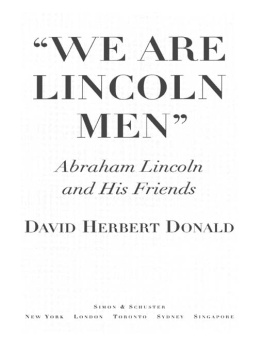
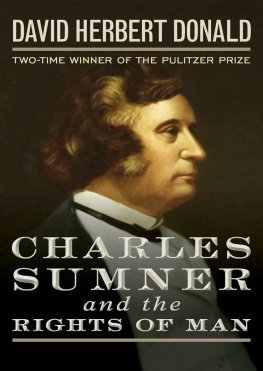
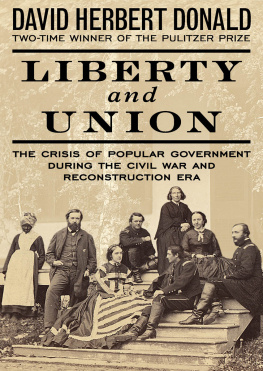
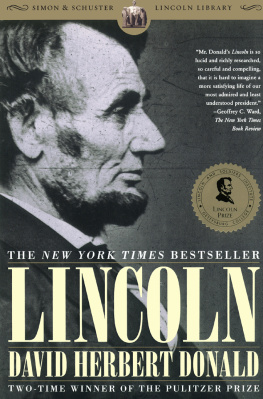

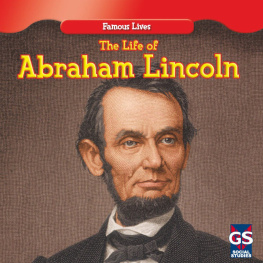


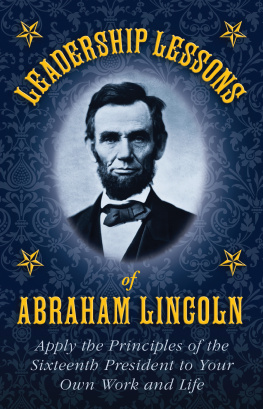
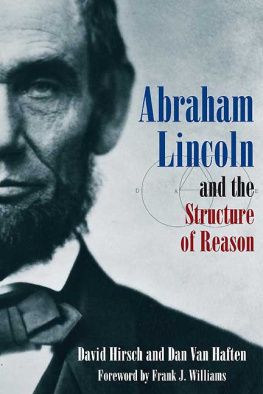


 092
092